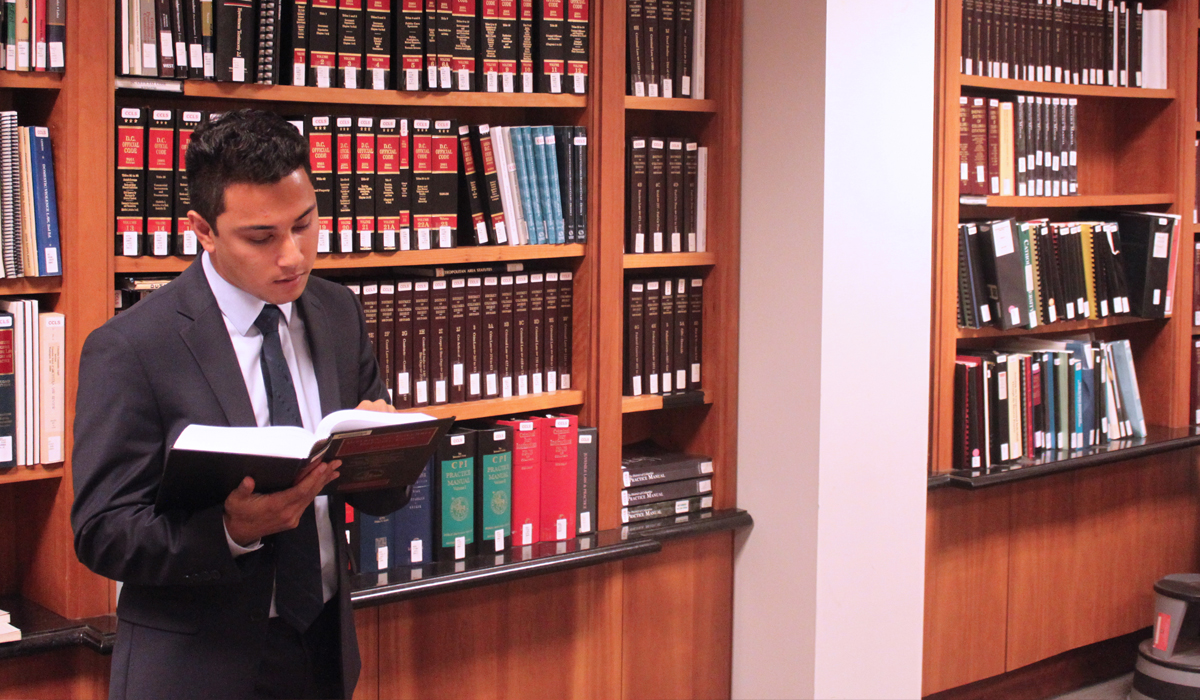The Families and the Law Clinic (FALC) is designed to help students develop lawyering skills through practical experience by taking on cases of domestic violence, family law, and immigration law. By representing persons who would otherwise proceed pro se, FALC students gain hands-on experience while learning the dynamics of domestic violence and poverty.
FALC students help their clients address immediate safety needs and assert their legal rights by obtaining emergency temporary and civil protection orders (CPO). Students also represent clients in longer-term litigation arising from their abusive family situations, including resolving complex divorce, legal separation, property and debt distribution, child custody, child visitation, and child support matters. Additionally, students respond to the unique needs of immigrant children by helping them obtain custody orders with Special Immigrant Juvenile Status findings in DC Superior Court.
Clinic students have full responsibility for every aspect of their cases. Under the supervision of experienced attorneys, FALC students may draft legal complaints and other pleadings, prepare and argue motions, and conduct trials before the Superior Court of the District of Columbia. Through this experience, students can refine their writing and research skills and develop effective trial techniques and other lawyering skills, such as counseling, interviewing, and negotiation.
In addition to their caseload, students participate in various community education projects and engage in policy work designed to address systemic social problems associated with domestic violence. For example, students serve as volunteer mediators in cases referred to the clinic by the Court. Students also volunteer at the D.C. Superior Court Self-Help Center, as well as engage in other legal education efforts in the community.
FALC is open to all second- and third-year students, and there are no course prerequisites. Students may enroll for 6 credits. With faculty members’ permission, students may reenroll for a second semester in FALC for 3 credits.
Course Learning Objectives
During the course of the semester FALC students will:
- Acquire and apply doctrinal knowledge in family law, domestic violence law, and professional responsibility, and other specialized areas, such as criminal law or immigration law.
- Locate the legal authority applicable to their client’s claim(s), analyze the authority to isolate the elements of the claim, and build a case that proves those elements.
- Take responsibility and leadership for advancing your client’s case and for making strategic choices in each stage of litigation.
- Generate an expansive list of options when making strategic decisions and justify their choices with concrete logical reasoning.
- Identify ethical issues and apply the D.C. Rules of Professional Conduct to resolve professional responsibility questions.
- Develop tools necessary to effectively collaborate with their peers, supervisor, and other actors in the legal system.
- Use reflective lawyering to critique and improve individual and team performance, thereby laying the foundation for growing and learning throughout their professional career.
- Connect with the legal profession’s ethical commitment to develop competencies and interests that guide and inspire future pro bono service to the community and facilitate access to justice for the low-income community in D.C. and elsewhere.
- Recognize the value of empathy and suspending judgment to the effective practice of law.
- Develop greater awareness and skills related to cross-cultural competence, implicit bias, and racism.
- Consider how race, ethnicity, gender, and immigration status are related to poverty, and how these facets of cultural identity impact a client’s choices and experience in the legal system, as well as the lawyer’s ability to be an effective advocate.
Student Office Hours
Each student will set a schedule of regular weekly office hours. Students enrolled for six credits must spend a minimum of 20 hours per week working at the clinic. Three (or more, depending on the week) of the hours will be spent attending a weekly seminar class that focuses on skill building, professional responsibility, and substantive law. Class time is counted as part of students’ weekly office hours.
Supervision Meetings
At least once a week, FALC faculty members will meet with each student team to discuss the cases they are handling. Attendance at these weekly meetings is required, and preparation for and participation in these sessions will be among the factors considered in a clinic student’s grade. Each team will be responsible for developing the agenda for the meeting. After all students have submitted their availability, we will set up a schedule for these weekly meetings.

